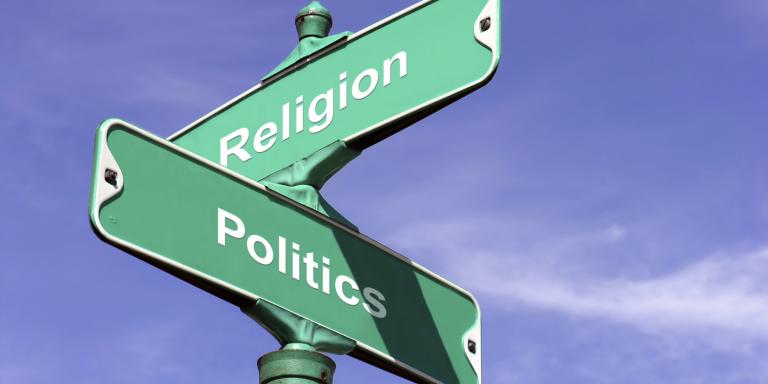
The intersection of religion and politics in the U.S. and the reasonings these diverse groups devise in carving out alliances may be one of the greatest mysteries of our times. How is it that one of the most (supposedly) devout religious groups in the country, Evangelical Christians, could so overwhelmingly vote for a presidential candidate in the last election that could not even accurately quote a Bible verse, let alone adhere to policies and beliefs so antithetical to the teachings of ? Party politics seems to be the answer, and the allure of political power and belonging is a danger for any religious group, especially a minority like American Muslims.
The allure of adopting party policy-ethics is strong, and it may be a result of our two-party system. Because the parties must try and represent the broadest coalition possible to ensure election, the various groups that identify with either parties can make for strange bedfellows. It explains why Evangelicals and Exxon Mobil, or Muslims and the LGBTQ lobby, can coexist under the same tent. Both parties have mastered the means of emphasizing a set of shared ideals while simultaneously downplaying undeniable ideological differences among various coalition members.
But let’s look at Evangelicals to start: 81 percent of white Evangelicals voted for Donald J. Trump, more than any other presidential candidate since 2000. Among all the characters in the Holy Bible, Trump is more reminiscent of Herod or Pharaoh than any of the prophets, yet he was able to narrowly claim electoral victory because of such overwhelming Christian support.
Evangelicals are not entirely to blame. White Catholics and Mormons also voted in heavy numbers for Trump. Despite racist and anti-immigrant rhetoric, even the Hispanic Catholic vote from Trump was four points higher than it was for Mitt Romney in 2012. Though this may be a result of Democrats simply not showing up, the underlying issue could not be clearer: Religion and politics are deeply intertwined in the U.S.
Perhaps the most obvious example is that of Jerry Falwell Jr., president of Liberty University. Falwell gained national notoriety after addressing his university’s student body on December 4, 2015, in which he lambasted President Obama for suggesting greater gun control following a recent shooting and encouraged his students to acquire concealed carry permits in order to “end those Muslims.”
Hearing Falwell speak on gun rights might convince an unknowing listener that the second amendment is actually the 11th commandment.
Falwell is also an unwavering supporter of Donald Trump, denying the adulterous affair between the president and adult film actress Stormy Daniels and claiming that his theological conviction of God’s mercy excuses all his other behavior. However, Falwell says is explicitly; Evangelicals are in Trump’s camp because they supported his draconian policies on immigration and his willingness to cut taxes for the rich.
But how then, do Evangelicals and other faith groups justify supporting various candidates whose moral underpinnings may clash with their religious teachings? Time and time again our two-party systems’ goal of reaching the broadest coalition possibly makes for nonsensical or difficult partnerships.
Trying to remain true to Islamic ethical teachings can be difficult in this type of political system. Take American Muslim communities, for example. Though a majority of American Muslims once supported George W. Bush in 2000, most have voted Democrat in recent years, with 54 percent supporting Clinton in 2016. Though this shifted occurred abruptly following measures put in place after 9/11 that targeted American Muslims, communities have had little time to consider how it can be a member of the Democratic coalition while possibly maintaining some views contrary to other powerful coalition members, such as pro-life sentiments and commitment to traditional notions of marriage.
This should not mean that Muslims must be passive members of a particular party coalition. We can enhance the political party of our choosing by prompting them to question their often black-or-white political and social stances.
For example, could Muslims stand at the forefront of a new pro-life movement, one in which the sanctity of life in the womb is safeguarded but not in ways that limit the reproductive rights and economic opportunities of women (as Republican policies often do)? Could we uphold family values by supporting living wages, maternity leave, and subsidized childcare instead of trying to force our conception of marriage onto others?
The prospect of being politically engaged and authentically Muslim is possible; however, it requires intellectual effort and the courage to raise our voices among our fellow partisans, from whichever party they may come. If not, we run the risk of adopting partisan ethics contrary to prophetic teachings, in the same vein as Falwell and Evangelical Christians.
This is especially important as more Muslims start taking leadership positions in political parties, particularly the Democratic Party. Though the American Muslim community should encourage its members to become more active and involved, and the community as a whole should continue to stand with marginalized communities, we should also remember our own commitment to our religious ethics and not allow ourselves to be co-opted into either party.
Charles M. Turner is a PhD student in Political Science at the University of Utah, and his research focuses on minority politics, particularly the inclusion of religious minorities in American democracies. Prior to continuing his studies, he served as the Muslim Life Coordinator at the University of Richmond, Government Teacher for the Madina School of Richmond, and a member of the Civic Outreach Committee at the Islamic Center of Virginia. His column appears (usually) in the third week of every month.












